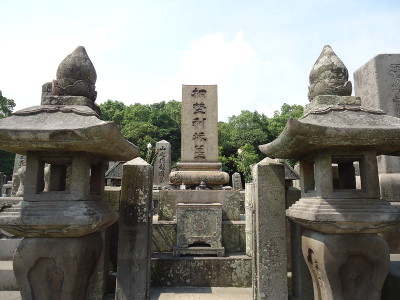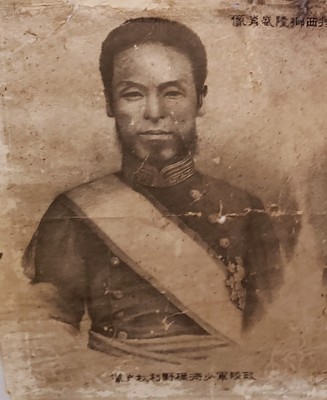Difference between revisions of "Kirino Toshiaki"
| Line 1: | Line 1: | ||
[[File:Kirino-toshiaki.jpg|right|thumb|400px|Image of Kirino from a period document on display at [[Saigo Takamori|Saigô Takamori's]] home on [[Amami Oshima|Amami Ôshima]]]] | [[File:Kirino-toshiaki.jpg|right|thumb|400px|Image of Kirino from a period document on display at [[Saigo Takamori|Saigô Takamori's]] home on [[Amami Oshima|Amami Ôshima]]]] | ||
| + | [[File:Kirino-toshiaki-grave.jpg|right|thumb|400px|Grave of Kirino Toshiaki at the [[Nanshu Cemetery|Nanshû Cemetery]] in Kagoshima]] | ||
*''Other Names'': [[中村]] 半次郎 ''(Nakamura Hanjirô)'' | *''Other Names'': [[中村]] 半次郎 ''(Nakamura Hanjirô)'' | ||
*''Japanese'': 桐野利秋 ''(Kirino Toshiaki)'' | *''Japanese'': 桐野利秋 ''(Kirino Toshiaki)'' | ||
Revision as of 08:12, 24 February 2020

- Other Names: 中村 半次郎 (Nakamura Hanjirô)
- Japanese: 桐野利秋 (Kirino Toshiaki)
Kirino Toshiaki was a prominent Satsuma han general known for his involvement in both events surrounding the Meiji Restoration, and the Satsuma Rebellion of 1877.
Kirino played an active role in the sonnô jôi movement as a shishi, and fought for Satsuma domain in the Boshin War.
Following the Restoration, he was one of a number of figures, alongside Saigô Takamori, Ôyama Tsunayoshi, and others, who received shôtenroku stipends from the Meiji government as a reward for their involvement in bringing about the Restoration.[1] He was granted the rank of Major General (shôshô) in the Imperial Japanese Army in 1871, but resigned from the military two years later and returned to Kagoshima.
He fought in the Satsuma Rebellion as commander-in-chief (sôshikikan) of the Satsuma forces, and was killed in the battle of Iwasakidani on Sept 24, 1877, just outside the grounds of Kagoshima castle.
Kirino is buried at the Nanshû Cemetery in Kagoshima.
References
- Plaques on-site at the Nanshû Cemetery, Kagoshima.[1]
- ↑ Plaques on-site at Terukuni Shrine.
